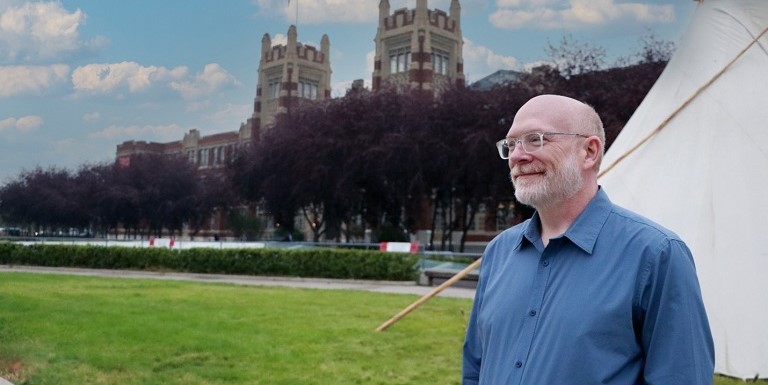Southern Alberta Institute of Technology: Teaching Innovators Programme Creates New Approaches to Learning

At Southern Alberta Institute of Technology (SAIT), we are leaders in applied education; we centre technology in our teaching and programming to equip our graduates with skills to be the problem-solvers of tomorrow. In fall 2023, SAIT welcomed Dr. Bill Rankin as Expert in Residence to facilitate the development of innovative teaching and learning approaches through the integration of new and emerging technologies. Through his Teaching Innovators Programme, Rankin will work with SAIT instructors to push the limits of technology integration in their own pedagogy.
“What is really powerful about SAIT is the emphasis the institution puts on connecting what happens here at the school with what’s happening in the world—having students gain experience using what they are learning in real situations,” said Rankin. He continued,
It is exciting to come to an institution that has a focus and vision for itself to be a lighthouse for a new way of making learning. Learning doesn’t just happen—we create these environments and communities and cultures around learning.
Rankin has more than 20 years of experience working with postsecondary institutions, governments, and learning organizations to design, develop, and implement innovative learning initiatives. His work experience has taken him around the world supporting the integration of technology. He’s held roles with Apple and pi-top as Director of Learning, and founded his own company, Unfold Learning LLC. Now filling the role of Expert in Residence, Rankin is looking forward to working with SAIT faculty, staff, and students to expand on the ways learning impacts the world and relationships in our community.
Student success is at the core of this new initiative. The programme brings SAIT instructors who are excited to try new approaches to teaching and learning together through the development and integration of technology-enhanced educational practices. And Rankin’s extensive experience will guide his mentorship as he provides direction to groups working through each phase of the programme.
Through the fall term, Rankin spent time getting to know the institution and connecting with participating educators through “tinkering” sessions, meant to serve as a time of discovery for instructors to refine and select their larger learning projects by the end of the year. Meeting regularly with fellow teaching innovators throughout the academic year, participants explore transformative teaching methods and tools, laying the groundwork to tackle innovation challenges.
Jim Szautner, Associate Vice President, Academic, at SAIT said,
What excites me about the Teaching Innovators Programme is it gets faculty working with faculty innovating on some of the finer elements of teaching and learning. The cross disciplinary teams Dr. Rankin has assembled span the entire institute, introducing faculty members to colleagues with similar passions. This very programme is forming a basis for a community of practice that can be sustainable in promoting innovation in teaching and learning.
When discussing his broad outlook on the programme, Rankin acknowledges the resources he has to offer and expresses his excitement about what SAIT brings to the table:
The learners are here and the partnerships are already established. This is going to be an exciting way for all of us to expand our understanding of the ways learning can impact the world and be part of a relationship with local and broader communities.
Winter 2024 will see instructors pursuing their projects and receiving feedback from key stakeholders before sharing their findings at an Innovation Showcase in the spring. Participants are empowered to try something new as they seek out applied, sustainable results specifically tailored to their classes and teaching style. Midway through the term, instructors will present to representatives of the Deans’ Council and SAIT’s Technological and Support Foundation teams who can offer important insights into the sustainable application of their projects as they continue to refine details.
According to Rankin,
This term, we’ll be starting with small scale experiments—little ‘bets’ that will help the Teaching Innovators see and understand how theory transforms into practice. Our goal is to aggregate these little pieces together into larger scale, more meaningful transformations of what happens in the classroom, helping learners to better discover, grow, and prepare for innovative work once they leave SAIT.
The year-long programme includes professional skill development workshops to enhance pedagogical toolkits covering research design, assessment strategies, media creation, and press interactions. Networking opportunities will connect participants with innovative teaching leaders and give instructors the opportunity to reflect and share discoveries with the SAIT community and beyond.
Once instructors are ready to move forward from project to sustainable practice, they’ll introduce these new methods of teaching and learning into their own areas of study—bringing these meticulously refined, personalized teaching and learning approaches to current and future SAIT students.
Lead image: Dr. Bill Rankin, Expert in Residence, at the Southern Alberta Institute of Technology
Jim Szautner is Associate Vice President, Academic, at Southern Alberta Institute of Technology in Calgary, Alberta, Canada.
Opinions expressed in Member Spotlight are those of the author(s) and do not necessarily reflect those of the League for Innovation in the Community College.










